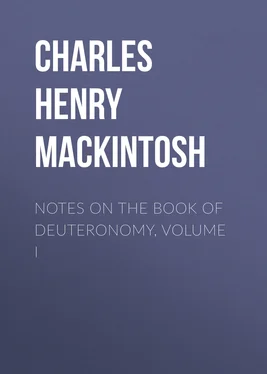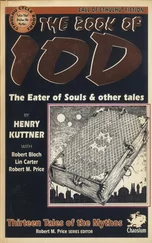Charles Henry Mackintosh - Notes on the Book of Deuteronomy, Volume I
Здесь есть возможность читать онлайн «Charles Henry Mackintosh - Notes on the Book of Deuteronomy, Volume I» — ознакомительный отрывок электронной книги совершенно бесплатно, а после прочтения отрывка купить полную версию. В некоторых случаях можно слушать аудио, скачать через торрент в формате fb2 и присутствует краткое содержание. Жанр: foreign_prose, foreign_antique, на английском языке. Описание произведения, (предисловие) а так же отзывы посетителей доступны на портале библиотеки ЛибКат.
- Название:Notes on the Book of Deuteronomy, Volume I
- Автор:
- Жанр:
- Год:неизвестен
- ISBN:нет данных
- Рейтинг книги:4 / 5. Голосов: 1
-
Избранное:Добавить в избранное
- Отзывы:
-
Ваша оценка:
- 80
- 1
- 2
- 3
- 4
- 5
Notes on the Book of Deuteronomy, Volume I: краткое содержание, описание и аннотация
Предлагаем к чтению аннотацию, описание, краткое содержание или предисловие (зависит от того, что написал сам автор книги «Notes on the Book of Deuteronomy, Volume I»). Если вы не нашли необходимую информацию о книге — напишите в комментариях, мы постараемся отыскать её.
Notes on the Book of Deuteronomy, Volume I — читать онлайн ознакомительный отрывок
Ниже представлен текст книги, разбитый по страницам. Система сохранения места последней прочитанной страницы, позволяет с удобством читать онлайн бесплатно книгу «Notes on the Book of Deuteronomy, Volume I», без необходимости каждый раз заново искать на чём Вы остановились. Поставьте закладку, и сможете в любой момент перейти на страницу, на которой закончили чтение.
Интервал:
Закладка:
Here we have the same precious golden link again. The Word which has reached us in the form of glad tidings is the Word of the Lord which endureth forever; and hence our salvation and our peace are as stable as the Word on which they are founded. If all flesh is as grass, and all the glory of man as the flower of grass, then what are the arguments of infidels worth? They are as worthless as withered grass or a faded flower; and the men who put them forth and those who are moved by them will find them to be so, sooner or later. Oh, the sinful folly of arguing against the Word of God—arguing against the only thing in all this world that can give rest and consolation to the poor, weary human heart—arguing against that which brings the glad tidings of salvation to poor lost sinners—brings them fresh from the heart of God!
But we may perhaps here be met by the question so often raised, and which has troubled many and led them to fly for refuge to what is called "the authority of the church." The question is this: "How are we to know that the book which we call the Bible is the Word of God?" Our answer to this question is a very simple one—it is this: The One who has graciously given us the blessed book can give us also the certainty that the book is from Him. The same Spirit who inspired the various writers of the holy Scriptures can make us know that those Scriptures are the very voice of God speaking to us. It is only by the Spirit that any one can discern this. As we have already seen, "the natural man receiveth not the things of the Spirit of God; … neither can he know them, because they are spiritually discerned." If the Holy Spirit does not make us know, and give us the certainty that the Bible is the Word of God, no man or body of men can possibly do it; and on the other hand, if He does give us the blessed certainty, we do not need the testimony of man.
We freely admit that on this great question a shadow of uncertainty would be positive torture and misery; but who can give us certainty? God alone. If all the men upon earth were to agree in their testimony to the authority of holy Scripture—if all the councils that ever sat, all the doctors that ever taught, all the fathers that ever wrote, were in favor of the dogma of plenary inspiration—if the universal church, if every denomination in christendom were to assent to the truth that the Bible is, in very deed, the Word of God—in a word, if we had all the human authority that could possibly be had in reference to the integrity of the Word of God, it would be utterly insufficient as a ground of certainty; and if our faith were founded on that authority, it would be perfectly worthless. God alone can give us the certainty that He has spoken in His Word; and blessed be His name, when He gives it, all the arguments, all the cavilings, all the quibblings, all the questionings of infidels, ancient and modern, are as the foam on the water, the smoke from the chimney-top, or the dust on the floor. The true believer rejects them as so much worthless rubbish, and rests in holy tranquillity in that peerless revelation which our God has graciously given us.
It is of the very last possible importance for the reader to be thoroughly clear and settled as to this grave question, if he would be raised above the influence of infidelity on the one hand and superstition on the other. Infidelity undertakes to tell us that God has not given us a book-revelation of His mind—could not give it: Superstition undertakes to tell us that even though God has given us a revelation, yet we cannot be assured of it without man's authority, nor understand it without man's interpretation. Now it is well to see that by both alike we are deprived of the precious boon of holy Scripture. And this is precisely what the devil aims at. He wants to rob us of the Word of God; and he can do this quite as effectually by the apparent self-distrust that humbly and reverently looks to wise and learned men for authority, as by an audacious infidelity that boldly rejects all authority, human or divine.
Take a case. A father writes a letter to his son at Canton—a letter full of the affection and tenderness of a father's heart. He tells him of his plans and arrangements, tells him of every thing that he thinks would interest the heart of a son—every thing that the love of a father's heart could suggest. The son calls at the post-office in Canton to inquire if there is a letter from his father. He is told by one official that there is no letter, that his father has not written and could not write—could not communicate his mind by such a medium at all, that it is only folly to think of such a thing. Another official comes forward, and says, Yes; there is a letter here for you, but you cannot possibly understand it; it is quite useless to you, indeed it can only do you positive mischief inasmuch as you are quite unable to read it aright. You must leave the letter in our hands, and we will explain to you such portions of it as we consider suitable for you. The former of these two officials represents Infidelity; the latter, Superstition. By both alike would the son be deprived of the longed-for letter—the precious communication from his father's heart. But what, we may inquire, would be his answer to these unworthy officials? A very brief and pointed one we may rest assured. He would say to the first, I know my father can communicate his mind to me by letter, and that he has done so. He would say to the second, I know my father can make me understand his mind far better than you can. He would say to both, and that, too, with bold and firm decision. Give me up at once my father's letter; it is addressed to me, and no man has any right to withhold it from me.
Thus, too, should the simple-hearted Christian meet the insolence of Infidelity and the ignorance of Superstition—the two special agencies of the devil, in this our day, in setting aside the precious Word of God. "My Father has communicated His mind, and He can make me understand the communication."—"All Scripture is given by inspiration of God ;" and, "Whatsoever things were written aforetime were written for our learning ." Magnificent answer to every enemy of God's precious and peerless revelation, be he rationalist or ritualist!
We do not attempt to offer any apology to the reader for this lengthened introduction to the book of Deuteronomy. Indeed we are only too thankful for an opportunity of bearing our feeble testimony to the grand truth of the divine inspiration of the holy Scriptures. We feel it to be our sacred duty, as most surely it is our high privilege, to press upon all to whom we have access, the immense importance—yea, the absolute necessity of the most uncompromising decision on this point. We must faithfully maintain, at all cost, the divine authority, and therefore the absolute supremacy and all-sufficiency, of the Word of God at all times, in all places, for all purposes. We must hold to it that the Scriptures, having been given of God, are complete, in the very highest and fullest sense of the word; that they do not need any human authority to accredit them, or any human voice to make them available: they speak for themselves, and carry their own credentials with them. All we have to do is to believe and obey, not to reason or discuss. God has spoken it: it is ours to hearken, and yield an unreserved and reverent obedience.
This is one grand leading point throughout the book of Deuteronomy, as we shall see in the progress of our meditations; and never was there a moment, in the history of the Church of God, in which it was more needful to urge home on the human conscience the necessity of implicit obedience to the Word of God. It is, alas! but little felt. Professing Christians, for the most part, seem to consider that they have a right to think for themselves—to follow their own reason, their own judgment, or their own conscience. They do not believe that the Bible is a divine and universal guide-book. They think there are very many things in which we are left to choose for ourselves; hence the almost numberless sects, parties, creeds, and schools of thought. If human opinion be allowed at all, then, as a matter of course, one man has as good a right to think as another; and thus it has come to pass that the professing church has become a proverb and a by-word for division.
Читать дальшеИнтервал:
Закладка:
Похожие книги на «Notes on the Book of Deuteronomy, Volume I»
Представляем Вашему вниманию похожие книги на «Notes on the Book of Deuteronomy, Volume I» списком для выбора. Мы отобрали схожую по названию и смыслу литературу в надежде предоставить читателям больше вариантов отыскать новые, интересные, ещё непрочитанные произведения.
Обсуждение, отзывы о книге «Notes on the Book of Deuteronomy, Volume I» и просто собственные мнения читателей. Оставьте ваши комментарии, напишите, что Вы думаете о произведении, его смысле или главных героях. Укажите что конкретно понравилось, а что нет, и почему Вы так считаете.












